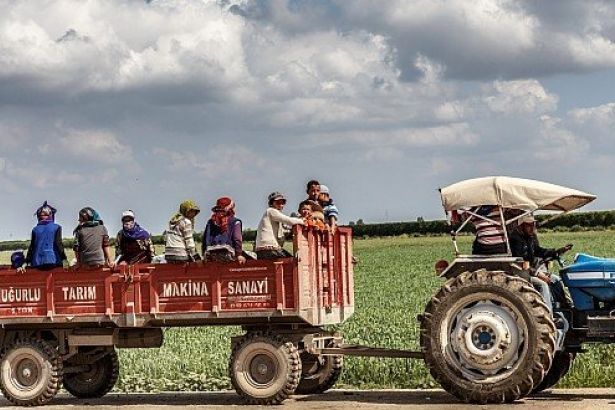Seasonal agricultural workers in Turkey "die seasonally"

In the first six months of 2019, 840 workers in Turkey were killed by occupational murders, while 205 of them were agricultural workers in May and June.
One of the major reasons that cause the death of seasonal agricultural workers is traffic accidents in Turkey. The Deputy General-Secretary of CHP Veli Ağbaba proposed a motion to investigate the conditions of vehicles that carry the seasonal workers and their property relating to shelter, nutrition, and calefaction.
The motion underlined that the seasonal agricultural workers were subjected to high risks. Indeed, 101 seasonal workers died at traffic accidents only in 2018.
Health and Safety Labour Watch: The efforts to improve the conditions of seasonal agricultural workers remain on paper
Murat Çakır, the representative of Health and Safety Labour Watch, stated that a bylaw was promulgated regarding the improvement of the conditions of seasonal agricultural workers.
The bylaw required better coordination of transport, increase in traffic control, enhancement of control of the safety of vehicles and traffic, and enhancement of measures taken by state institutions of concern in order to improve migration of seasonal agricultural workers. Such measures further included an increase in train journeys and enhancement of temporary accommodation offered by state institutions. Nonetheless, Çakır underlined that the bylaw was not applied in reality.
The risk of death of mothers is ten times, it is five times bigger for babies
The number of seasonal agricultural workers including their families reach five hundred thousand. When a baby is born to parents who are seasonal agricultural workers, her/his life as a seasonal agricultural worker starts. The risk of death of mothers, who live in fields far away from water, sanitation, and nutrition, is ten times bigger. Similarly, the risk of death of babies is five times bigger.
Seasonal agricultural workers cannot access to health service
The bylaw underlined that seasonal agricultural workers would be subjected to a health check. However, the bylaw is not practiced in reality.
Moreover, seasonal agricultural workers are face to face with the lack of clean water for nutrition and sanitation, lack of clean facilities, and malnutrition. Seasonal agricultural workers often have lung and skin problems since they are subjected to chemical substances and UV rays.
From far away to farther away
Seasonal agricultural workers are categorized into three. The first category constitutes the local ones working in their region. The second category constitutes the ones who travel to another region and stay there during the season.
The third category constitutes the mobile agricultural workers whose number is rising since the 2008 crisis. The mobile agricultural workers, which include landless peasants, small-holders, and share-croppers, are subjected to the most unfavorable conditions.
The seasonal workers begin their travel beginning in March. They work in cotton fields in Urfa and Adana; fruit and vegetable, olive, and tobacco fields in Mediterranean and Aegean regions; fruit and vegetable, and hazelnut fields in Marmara region; hazelnut, tea, and tobacco fields in the Black Sea region; and vegetable fields in Central Anatolia. Women, children, and Syrians constitute the backbone of seasonal workers.



